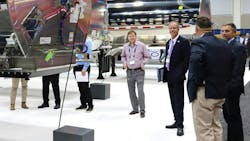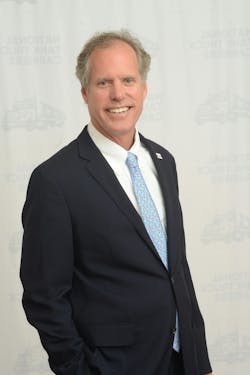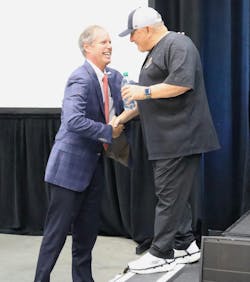Herb Evans, Eagle Transport Corporation vice chairman, has filled many roles for the family-owned tank truck carrier.
The first one was matchmaker.
Eagle founder Don Stallings—then an imposing 6-4, 250-lb. former defensive lineman for the Washington Redskins—had a home down the street from Evans in Atlantic Beach, North Carolina, when he was growing up, and while doing summer jobs for the 1960 NFL draft pick, like mowing his lawn, he discovered Stallings is a decent, and business-savvy, man who was a good fit for his mom, Billie.
“I knew him because he was the big football player down the street, and everybody paid me $10 to mow their lawns, but he only paid me $5, even though he had a big double-wide lot,” Evans recalled with a chuckle. “But he and his wife divorced, and my parents were divorced, and I was 13 years of age, so I put them on a date together.
“They ended up dating for a couple years, and then they got married.”
That was 43 years ago, and the two still are happily married—a good indicator of Evans’ effectiveness when he’s enthusiastic about the work. And he brought the same energy to his newest position as National Tank Truck Carriers’ 2023-24 chairman of the board, helping further the group’s goal of tackling industry challenges, like regulatory constraints and the driver shortage, while growing the tank truck team.
The launch of NTTC’s industry branding campaign and gotanktruck.com website is one the association’s biggest wins on his watch, Evans maintained. The campaign produced 10 million impressions and drove 110,000 visitors to the site in the first three months after it debuted in two test markets. Twenty-two percent of visitors wanted additional information about the segment that makes up only 6% of trucking but hauls 27% of the tonnage—and 77% weren’t currently in the industry.
“There are a lot of exciting things going on right now within our organization,” Evans said.
Tank truck calling
The same goes for Eagle, a Rocky Mount, North Carolina-based bulk hauler that today runs 550 diesel-powered tractors and 800 tank trailers and employs more than 1,000 people—with Stallings still serving as chairman. The now 85-year-old attends monthly financial meetings and checks in regularly, Evans attested. “He’s still very involved,” he said. “He calls several times a day, and he’s always looking at his computer, wanting to know why certain trucks haven’t moved, or why an incident occured.”
Stallings’ job was to chase quarterbacks after attending the University of North Carolina on a football scholarship. But professional pigskin didn’t pay well back then, and his father fell ill in his second year, so he returned home to help by starting a small tank truck business delivering home heating oil for curing tobacco. He eventually recruited a few buddies, bought several other trucking companies under different names, and then founded Eagle in 1965. “He wanted something he could market, and he figured a red, white, and blue eagle was something he could really sell,” Evans explained. “He’s a patriotic guy, and so the idea of an eagle, with the great Americana behind it, appealed to him.”
Eagle started hauling propane in the late 1960s and was the largest propane carrier in North Carolina by the early 70s. The company was delivering propane to the Carolinas, Georgia, Florida, and Virginia by the late 70s. Eagle grew as a gas hauler while John Thomas was president, expanded through several convenience-store fleet acquisitions during Bill George’s tenure as president, and entered the chemical sector with the help of Lance Collette, who now serves as Eagle president and chief executive officer.
The operation now boasts 21 brick-and-mortar terminals in the Mid-Atlantic, Southeast, and Texas and approximately 800 company drivers, and delivers 4 billion gallons of petroleum products annually. The fully owned fleet includes about 500 petroleum tankers, 200 chemical units, and 100 pneumatic dry bulk trailers, Evans said.
Family-fueled expansion
Evans entered his stepfather’s business after graduating from Elon University. He started in the shop, changing brakes and tires, moved into dispatching, then marketing, and finally migrated into management as director of operations for Eagle’s northern district. He went on to serve as the carriers’ vice president of operations for several years, executive VP under George for 10 years, and rose to vice chairman under Stallings in 2017, when George retired, and Collette ascended to president and CEO.
Eagle’s growth during Evans’ 35 years with the company has been 50% organic and 50% acquisitional, he said. The 2019 purchase of Eco-Energy Biofuels’ truck fleet boosted Eagle’s ethanol-hauling business, and the 2023 addition of Bulk Carriers in Dalton introduced it to the dry bulk segment. Now Evans is focused on securing the future for Eagle, which he hopes remains in the family. He has two sons, Connor, 20, a sophomore at UNC, an Edward, 17, a junior in high school.
“I’m certainly hoping one of them will take over the company one day,” he shared.
Before turning his attention to the next task, the 2023-24 NTTC chairman spoke with Bulk Transporter for our State of the Industry address.
Questions and answers are edited for space and clarity.
Bulk Transporter: How proud are you of Eagle’s growth over the last seven decades?
Herb Evans: “I’m extremely proud. We started out as a small company, and one of our old slogans was ‘Large enough to serve, small enough to care,’ and we have continued that into everything we still do. We have deals with all the major oil companies, and the largest convenience store chains out there, and we’ve seen incredible growth with all of them. And I’m extremely proud of all our accomplishments, and the people here. Two of our long-time operations directors recently retired, only days apart, and they’d been with us for nearly 30 years. I hired both early in my career. So it truly is a company where people come to work and stay for life. The new vice president of operations and our two district managers have been around 15 to 25 years.”
BT: Eagle leased all its equipment early on. Why was going to all company drivers and company-owned trucks and trailers a key milestone?
HE: “It’s just been our model. When I first started out, we were starting to buy trucks. But we had some major growth in my early days, and we grew with leased trucks through a Ryder program. But our goal was to get to where we could buy our own trucks and hire company drivers. We believe there’s more control when it’s your truck and your driver, vs. it being somebody else’s driver or truck. That’s the model that works best for us.”
BT: What is Eagle’s fastest-growing segment today?
HE: “We’re expanding all segments, but the chemical segment is very strong. We’re growing by over 30% annually in our chemical division.”
BT: Yes, you mentioned Eagle added Eastman as its first chemical account in 2011 and now boasts over 25 major chemical accounts. To what do you attribute that success?
HE: “Hiring the right people. We just promoted Bobby Vaughn, who ran our Kingsport chemical terminal. We now have over a dozen of our existing terminals touching chemicals, and we needed one person to really go out and educate our people, to be sure we’re putting the right processes in place everywhere, and he was clearly the man for it. We looked outside and internally for about four months, and he’s just done a great job. But we also have a president who’s dedicated to it in Lance Collette, and I really attribute our growth in chemicals to him. He's incredibly passionate about the segment.”
BT: Do you see more acquisitional growth on the horizon?
HE: “Yes. We are looking at several potential deals across every division in the next 24 months.”
BT: Industry veterans like Dean Kaplan, Greg Hodgen, Steve Rush, and Hans Schaupp encouraged you to be more active early in your involvement with NTTC. Why is it important to stay engaged?
HE: “It’s as surefooted as it’s been in the 25 years I’ve been involved, and we need to keep it that way. Not taking anything away from NTTC’s history, but the association is doing a great job of keeping everyone in the tank business up to speed on the regulatory side, with what Capitol Hill is trying to force on us. And they’re a great educational resource for all of us.”
BT: What was your goal going into your term as NTTC chairman?
HE: “For Washington, D.C. to understand the realities of trucking, our driver shortage, California’s proposed emissions laws, and tank trucking in general. We would love to see some relief on the federal excise tax. They’re not going to drop FET if we don’t give them another way to collect the tax dollars it currently generates. We must find other solutions. So that’s certainly one of my goals. I want FET off our backs and placed elsewhere. It’s a World War I-era tax that should be shelved permanently.
“I’ve always said there’s no more noble job in America than driving a truck. But it’s up to us as trucking company owners and Americans to offer jobs to our military veterans coming in from fighting around the world. And NTTC is trying to get D.C. to work on proving these guys have driven trucks elsewhere, and we’ve made great strides. We still have a long way to go, but hiring veterans is a great way to help the driver shortage. They’re the exact type of men and women we need. We all need drivers, and we’re starting to get some traction through the registered apprenticeship and other programs. And that’s due to the effort of the great staff we have at National Tank up in Arlington, Virginia.”
BT: The tank truck industry generates $41 billion in annual revenue, but give the many challenges facing the industry, is it still healthy?
HE: “Yes, it is healthy. But inflation has made all our costs go up. We could barely get equipment during the pandemic, so peoples’ tractor and trailer orders were going out two and three years over normal trade cycles. Obviously, if you extend the life of a piece of equipment, your maintenance costs skyrocket, and that was another increased cost, and I don’t know if the rates have been able to keep up. But one of the biggest issues is tort reform. You drive down the interstate, and eight out of 10 billboards feature some attorney standing on top of a tractor-trailer, screaming about, ‘If you’ve ever even seen a truck, here’s a million dollars.’ So we’ve got to get some common-sense tort reform to be fair. Everybody wants our roads to be as safe as they can be, but we need some common sense here. Rob Sandlin, with Florida Rock & Tank, was very instrumental with some changes last year in Florida, and I applaud him, American Trucking Associations and NTTC for their effort there. The biggest thing is just finding drivers or getting people to look at our industry. It’s a great industry. We offer so many opportunities other than driving a truck, from IT specialists to mechanics and dispatchers.”
BT: Is operating a small tank truck business profitably becoming more difficult to do?
HE: “It’s a tough industry with low margins, high costs, and high entrance costs. But I also feel the industry is on rock-solid ground right now. We’ve got great tank truck operators throughout the nation. Even though there's been a lot of consolidation going over the last decade, there still is opportunity for people to become small, regionalized carriers and do a good job. And we’re all servicing our customers the best we ever have.”
BT: Is diversification, or the one-stop, supply-chain shop mentality, the key to survival in today’s trucking world?
HE: “I see some people staying in whatever segment of tank they’re in. But our plan is to continue to diversify and grow outside of our basic petroleum footprint. On the dry side, we now haul PET [polyethylene terephthalate], PE [polyethylene], and PVC [polyvinyl chloride plastics], powdered PIA [purified isophthalic acid]; and on the chemical side, we’re doing plasticizers, solvents, light acids, caustic, glycols, and petrochemicals. We will continue to diversify Eagle Transport without losing focus on what got us to where we are today.”
BT: What are some other positives you see in the industry today?
HE: “One of the positives of Covid was people realized how important trucking is to our national security, and our nation’s supply chain. And through all that, I saw a little bit of positive press, where, on our gasoline and diesel side, people realized none of their of vehicles are moving without gas and diesel reaching their communities. So, for the first time in years, maybe since Smokey and the Bandit, we saw a little bit of positive press out there. That was great. But most companies in the tank truck business have been able to maintain positive revenue and profitability by basically doing the right things, and getting their companies right-sized coming out of Covid. And even though things seem to be slowing down in other segments of trucking right now, tank trucks haven’t been impacted nearly as much. Most people have figured out their sweet spot in the past 24 months, and they’re coming out as stronger companies that are ready for whatever happens within our economy.”
BT: How instrumental is NTTC’s role in paving the way toward future success in the tank segment?
HE: “[NTTC President and CEO] Ryan Streblow and his team are doing a great job of promoting us in a positive light on Capitol Hill. From what I’m experiencing, and what I’ve seen out there, we have a strong group of young men and women fighting for us in Washington, and our message is as clear as it’s ever been.”
BT: What is the current state of the association?
HE: “There has been a lot of consolidation in all of trucking, and certainly on the tank truck side, yet we have more members today than we did a year ago, so that’s very positive. My predecessor, Randy Clifford, was very instrumental in that. He loves tracking our membership. We have bi-weekly meetings, and that’s one of the last things we have to share with him in every meeting. And every month, even with all the consolidation going on, we’re still seeing growth. So our membership is expanding, and we have more [political action committee] money helping us on Capitol Hill than ever before. We also have more money in the bank than ever—and the organization at large is as strong as it’s ever been.”
BT: How do you feel about the zero-emission vehicle timelines coming from the California Air Resources Board (CARB) and the federal government?
HE: “Emissions are a major issue, absolutely. We moved it from Tier 2 to Tier 1 a couple years ago, at NTTC, and we’re a founding member of the Clean Freight Coalition. But Washington, D.C. has absolutely tried to shove electric vehicles down our throats. I was talking to a friend of mine who is a Mercedes Benz dealer, and he said he’s not selling one [electric vehicle] a month, whereas he used to sell one a day, or more. So, all of a sudden, it’s like we’re waking up to maybe there are other solutions than electric vehicles. At our recent NTTC winter board meeting, we had somebody from Cummins talking about all the options, and hydrogen seems to be one of the better options going forward to me. I believe there are going to be better solutions and opportunities with hydrogen than with the batteries, etc., but time will tell.”
BT: How is Eagle approaching the EV transition?
HE: “We’re always listening to what the engine manufacturers and our tractor suppliers tell us is going on. And we’ve tested several [alternative-energy tractors]. But not many of our petroleum accounts want us pulling up to a loading rack or delivering to a c-store in an electric vehicle just yet, so we still run all diesel trucks.”
BT: Do you expect to purchase any zero-emission vehicles any time soon, or do you think timelines will be pushed back?
HE: “I just don’t think the technology exists today, so we're waiting and listening intently to what Washington and our engine OEMs are telling us.”
BT: You, founder Don Stallings, and so many others have put so much time and energy into Eagle Transport. Is the goal to keep it a family-owned and -operated business?
HE: “We’ve been approached, like everybody, by people wanting to take us public, or merge with us, or acquire us, and we really have no interest. We want to keep it a family-owned and ran business for a long time into the future, and that’s why we’re always looking and being aggressive about further diversification and acquisition of other companies, not only in petroleum, but also in chemical and dry bulk.”
About the Author
Jason McDaniel
Jason McDaniel, based in the Houston TX area, has more than 20 years of experience as an award-winning journalist. He spent 15 writing and editing for daily newspapers, including the Houston Chronicle, and began covering the commercial vehicle industry in 2018. He was named editor of Bulk Transporter and Refrigerated Transporter magazines in July 2020.





